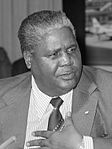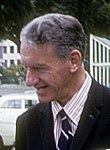| |||||||||||||||||||||||||||||||||||||||||||||||||||||||||||
All 100 seats in the House of Assembly | |||||||||||||||||||||||||||||||||||||||||||||||||||||||||||
|---|---|---|---|---|---|---|---|---|---|---|---|---|---|---|---|---|---|---|---|---|---|---|---|---|---|---|---|---|---|---|---|---|---|---|---|---|---|---|---|---|---|---|---|---|---|---|---|---|---|---|---|---|---|---|---|---|---|---|---|
| |||||||||||||||||||||||||||||||||||||||||||||||||||||||||||
 | |||||||||||||||||||||||||||||||||||||||||||||||||||||||||||
| |||||||||||||||||||||||||||||||||||||||||||||||||||||||||||
 |
|---|
General elections were held in Southern Rhodesia between 14 February and 4 March 1980 to elect the members of the House of Assembly of the first Parliament of the independent Zimbabwe.[1][2] As stipulated by the new Constitution of Zimbabwe produced by the Lancaster House Conference, the new House of Assembly was to comprise 100 members, 80 of whom would be elected proportionally by province by all adult citizens on a common roll, and 20 of whom would be elected in single-member constituencies by whites on a separate roll.
The result was a victory for Robert Mugabe's Zimbabwe African National Union, contesting the election as ZANU–PF, which won 57 of the 80 common roll seats, giving it a majority in the 100-member House of Assembly. Joshua Nkomo's Zimbabwe African People's Union, contesting the election as the Patriotic Front, won 20 of the 80 common roll seats, with the remaining 3 going to Abel Muzorewa's United African National Council. Ian Smith's Rhodesian Front won all 20 of the white roll seats, with most of its candidates running unopposed. As a result of the election, Robert Mugabe became Zimbabwe's first prime minister upon the country's independence on 11 April 1980.
There was widespread violence during the election.[3]
- ^ Gregory, Martyn. "The 1980 Rhodesian Elections — A First-Hand Account and Analysis", The World Today 36, no. 5 (1980): 180-188.
- ^ Gregory, Martyn. "The Zimbabwe election: the political and military implications", The Journal of South African Studies 7, no. 1 (1980): 17-37.
- ^ Kwashirai, Vimbai Chaumba, ed. (2023), "Violence, a Colonial Curse: The 1980 General Elections", Election Violence in Zimbabwe: Human Rights, Politics and Power, Cambridge University Press, pp. 8–34, doi:10.1017/9781108120265.003, ISBN 978-1-107-19081-8



